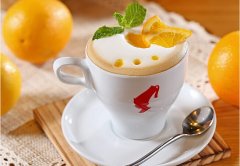Nine aspects to identify the good and bad of coffee beans
Chinese people like to drink tea, tea culture has a long history, but now with the introduction of Western culture, people slowly accept coffee, to now the popularity of coffee in major cities, by the same token, many people who like to drink coffee will also slowly study coffee knowledge! Of course, people must be most concerned about the quality of coffee, so how to distinguish the advantages and disadvantages of coffee? This starts with the source of coffee. There are nine ways to identify the quality of coffee beans. Let's take a look at it:

First, the trap of 100% pure coffee. This is the most obvious hint, because "100% pure coffee" does not indicate quality, but only means the use of high-profit, better anti-parasite Robusta coffee beans of low quality. This kind of coffee tastes more bitter. The shelf life is much more important than the "baking" time. Don't just think about judging the freshness of coffee by the date of baking, regardless of the expiration date must be an unwise choice.
Second, a wide variety of tastes is not a good thing. If a brand produces a variety of flavors of handmade coffee, they must not pay attention to the quality of coffee beans. This is not to say that a professional baker can't make two or three flavors (Klatch is a good example), but when you have a lot of choices, your chances of finding a good cup of coffee are greatly reduced. Over-reliance on blended coffee. A common cost-cutting technique is to buy low-grade coffee beans and mix them. If a company sells 10 kinds of coffee, eight of which are blended coffee, they must not be trusted.
Third, pay attention to the baking level. Most professional coffee roasters don't use words like bright, medium, or dark to describe roasting grades. They describe them as exaggerated synaesthesia, such as earthy or chocolate-colored coffee beans. If you don't see a word for flavor, it's likely that the coffee bean baker is unprofessional. This is by no means a good sign.
Fourth, pay attention to whether it is cupped or canned. Dehydrated coffee is usually bottled in glass, but it may also be packed in cans and plastics. None of this is environmentally friendly: more carbon dioxide is produced in both production and transportation. There is also a problem with transparent bags, because light is the main natural enemy of coffee beans, and darkness is their old friend.
Fifth, there is too much coffee in stock, which is worth thinking about. Unless you are buying coffee for the army or office, buy less than 2 pounds at a time. Because it deteriorates over time, and the most famous bakers don't want their products to stay on the shelf for a few weeks.
Sixth, the popular term for coffee. Natural, pure and eco-friendly sounds great, but it doesn't carry much weight. Look for USDA organic certification or Fair Trade certification stickers-many good coffees don't have these certifications, but beware of the traps behind the fancy words. The really useful information is the altitude of growth, the description of processing and the type of variety.
Seventh, whole bean coffee is not sold. If a brand does not sell whole bean coffee, it is not a good sign.
Eighth, coffee is sold in boxes. If it is not properly packaged, it is likely to be of poor quality, as it shows that the coffee does not pay attention to quality assurance and freshness, and the coffee will deteriorate quickly when exposed to light and air.
Ninth, there is a lack of local characteristics. Countries like Colombia and Guatemala are not small. They have many kinds of coffee. Listing farms and regions can stimulate purchasing confidence, and vice versa.
The quality of a cup of coffee is affected by the quality of coffee beans, so if you want a strong and good coffee, you can't choose bad coffee beans, that is to say, the step of choosing coffee beans should not be taken lightly. The above nine aspects allow you to easily select good coffee beans, plus the correct grinding, brewing method, a good cup of coffee will come out!
Important Notice :
前街咖啡 FrontStreet Coffee has moved to new addredd:
FrontStreet Coffee Address: 315,Donghua East Road,GuangZhou
Tel:020 38364473
- Prev

Little-known things about coffee
Maybe the first thing you do when you get up in the morning is to have a cup of coffee. Maybe you spend your spare time every week in a cafe with three or five friends, chatting, surfing the Internet, reading books, and so on! As more and more people fall in love with coffee, coffee has become the most popular drink in the world, but your understanding of coffee is not very clear! 1. According to legend, coffee is the most picked up by goats.
- Next

How to make the best coffee? Mixed coffee beans!
If you drink coffee regularly, do you know how to mix a cup of mellow coffee with excellent flavor? Blended coffee is not a strange term, it is also known as the mix of coffee, nowadays popular Italian coffee almost all belong to the category of mixed coffee! Usually two or more different varieties of coffee or the same variety of coffee are usually combined for a cup of excellent flavor coffee.
Related
- Detailed explanation of Jadeite planting Land in Panamanian Jadeite Manor introduction to the grading system of Jadeite competitive bidding, Red bid, Green bid and Rose Summer
- Story of Coffee planting in Brenka region of Costa Rica Stonehenge Manor anaerobic heavy honey treatment of flavor mouth
- What's on the barrel of Blue Mountain Coffee beans?
- Can American coffee also pull flowers? How to use hot American style to pull out a good-looking pattern?
- Can you make a cold extract with coffee beans? What is the right proportion for cold-extracted coffee formula?
- Indonesian PWN Gold Mandrine Coffee Origin Features Flavor How to Chong? Mandolin coffee is American.
- A brief introduction to the flavor characteristics of Brazilian yellow bourbon coffee beans
- What is the effect of different water quality on the flavor of cold-extracted coffee? What kind of water is best for brewing coffee?
- Why do you think of Rose Summer whenever you mention Panamanian coffee?
- Introduction to the characteristics of authentic blue mountain coffee bean producing areas? What is the CIB Coffee Authority in Jamaica?

